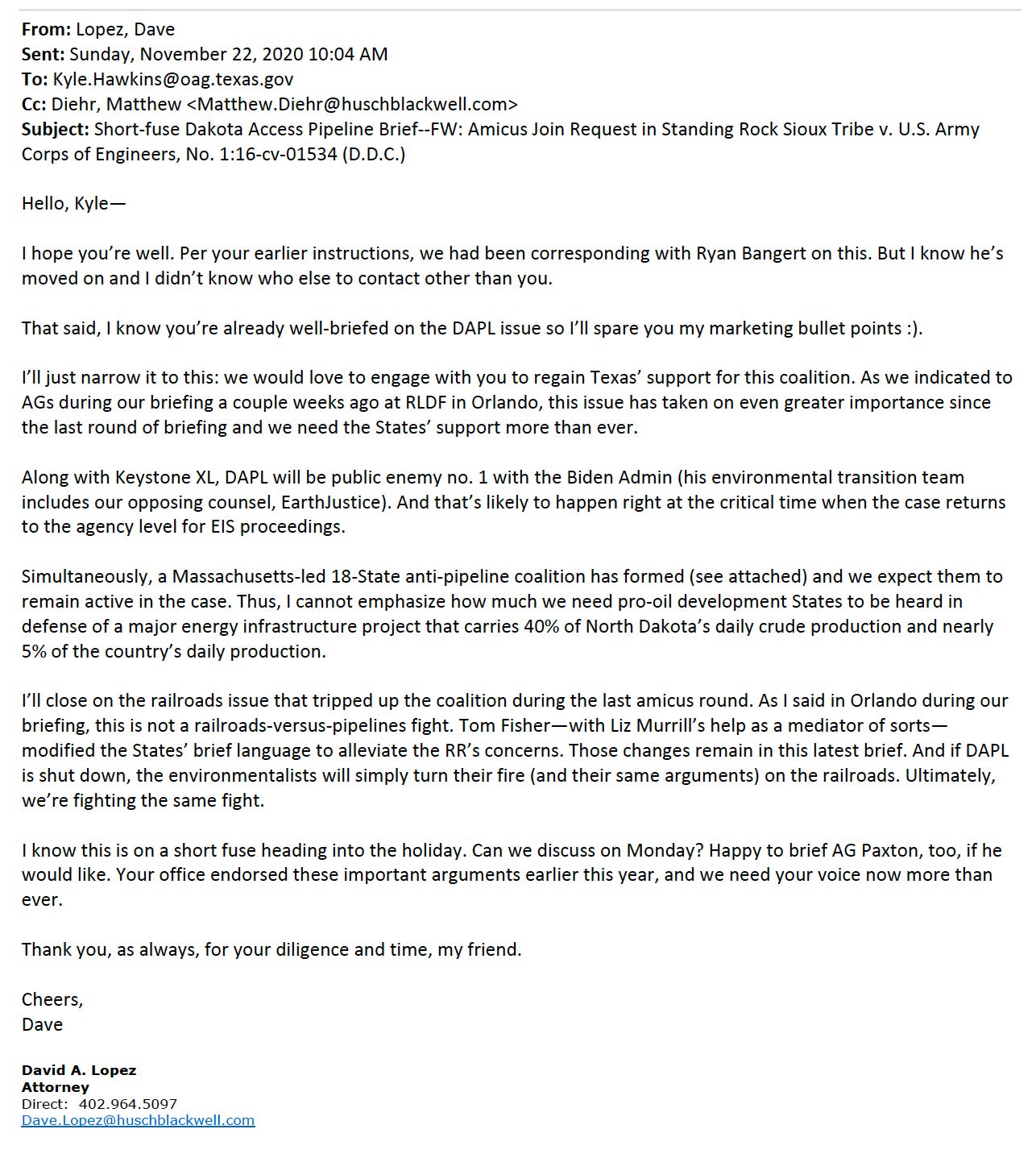Industry lawyers solicited Republican attorneys general help on K-XL and DAPL pipelines
Emails show the law firm Husch Blackwell gave state attorneys general a private briefing about pipeline projects and were involved in an amicus brief supporting DAPL

Months before Joe Biden was sworn in as President, industry lawyers were working behind-the-scenes with Republican attorneys general to gain support for the controversial pipeline projects Keystone XL and the Dakota Access Pipeline (DAPL). Materials obtained by Documented provide details on what happened.
Lawyers from the law firm Husch Blackwell gave state attorneys general a private briefing about pipeline projects in November 2020. The briefing occurred during a Republican Attorneys General Association (RAGA) meeting that took place in Orlando, Florida. Email correspondence obtained by Documented also shows Husch Blackwell’s involvement in an amicus brief, led by the Republican Attorney General from Indiana, supporting DAPL. The firm’s clients include oil and gas pipeline operators.
RAGA operates as a pay-to-play scheme, offering exclusive access to Republican attorneys general and their staff. The higher the contribution, the more benefits the donor receives. Documented has reported on this in the past, and we recently published a breakdown of the group’s 2020 donors. In exchange for a minimum $50,000 annual contribution, donors can lead issue briefings with attorneys general. Other RAGA membership benefits include exclusive events, dinners and policy conference calls.
In one of the emails, Husch Blackwell lawyer David Lopez referenced a Rule of Law Defense Fund (RLDF)--RAGA’s policy arm--issue briefing about pipelines urging Texas Solicitor General Kyle Hawkins to join an amicus brief supporting the continued construction of DAPL. Two lawyers from Husch Blackwell were copied on an email sent by the Indiana Attorney General’s office requesting states join the brief. Lopez previously served as both the Nebraska Deputy Solicitor General and Assistant Attorney General, and now heads the Husch Blackwell “State Attorneys General Practice.”
“As we indicated to AGs during our briefing a couple weeks ago at RLDF in Orlando, this issue has taken on even greater importance since the last round of briefing and we need the States’ support more than ever,” Lopez wrote in an email to Hawkins. “As I said in Orlando during our briefing, this is not a railroads‐versus‐pipelines fight. Tom Fisher—with Liz Murrill’s help as a mediator of sorts—modified the States’ brief language to alleviate the RR’s concerns. Those changes remain in this latest brief. And if DAPL is shut down, the environmentalists will simply turn their fire (and their same arguments) on the railroads.”
Read the emails for yourself
The November meeting with Husch Blackwell
Texas did not join the amicus brief, but according to a meeting agenda obtained by Documented, eight of the dozen Republican attorneys general who did sign the amicus brief also attended the November 2020 RAGA meeting. Iowa Democratic Attorney General Tom Miller also joined the brief.
Why is this important right now?
The new revelations come in the midst of an imminent legal battle between Republican attorneys general and the Biden administration over climate policies. During his first day in office, Biden issued an executive order to revoke a key permit for the Keystone XL Pipeline. While environmental advocates praised the action, pushback against the Biden administration’s commitment to address the climate crisis is quickly taking shape. Fox News has been promoting misleading job claims, and U.S. Senator Joe Manchin urged Biden to reverse the action. Fourteen Republican attorneys general signed a letter to President Biden which stated they were “reviewing available legal options to protect our residents and sovereign interests.”
The news coverage of the legal threats against the Biden administration led by Republican attorneys general, which has been heavily promoted by RAGA, is a welcome pivot for the organization. The group had a rough start to 2021 after Documented first reported RLDF sent robocalls on the eve of the deadly U.S. Capitol attack urging supporters to “stop the steal” and march on the U.S. Capitol. Following this, RAGA’s Executive Director Adam Piper resigned and several Republican attorneys general tried to distance themselves from the organization. As Documented reported, numerous members of RAGA suspended or paused funding in the aftermath of the news coverage surrounding the robocall. These included Microsoft and three large utility companies - NRG, American Electric Power, and CenterPoint Energy, all of which told Documented they wouldn't be funding RAGA in 2021.
The legal battle over pipelines is likely just one of many instances where corporations and other wealthy donors will likely continue to fund RAGA--despite the obvious reputational difficulties that might occur. Offering exclusive and private access to Republican attorneys general and their staff, is an easy sell to industrial players seeking legal help during the Biden administration.
RAGA has formally dubbed a new effort to block the Biden agenda the “Save and Defend” initiative. It’s largely based on similar efforts during the Obama administration. RAGA has been planning for this moment for months before President Biden took office. Prior to the 2020 Election, the Washington Times reported RAGA saying they were “preparing for two Category 5 storms” and referred to a meeting with 26 Republican attorneys general and staff where they mapped out a legal strategy and “played some war games.”





